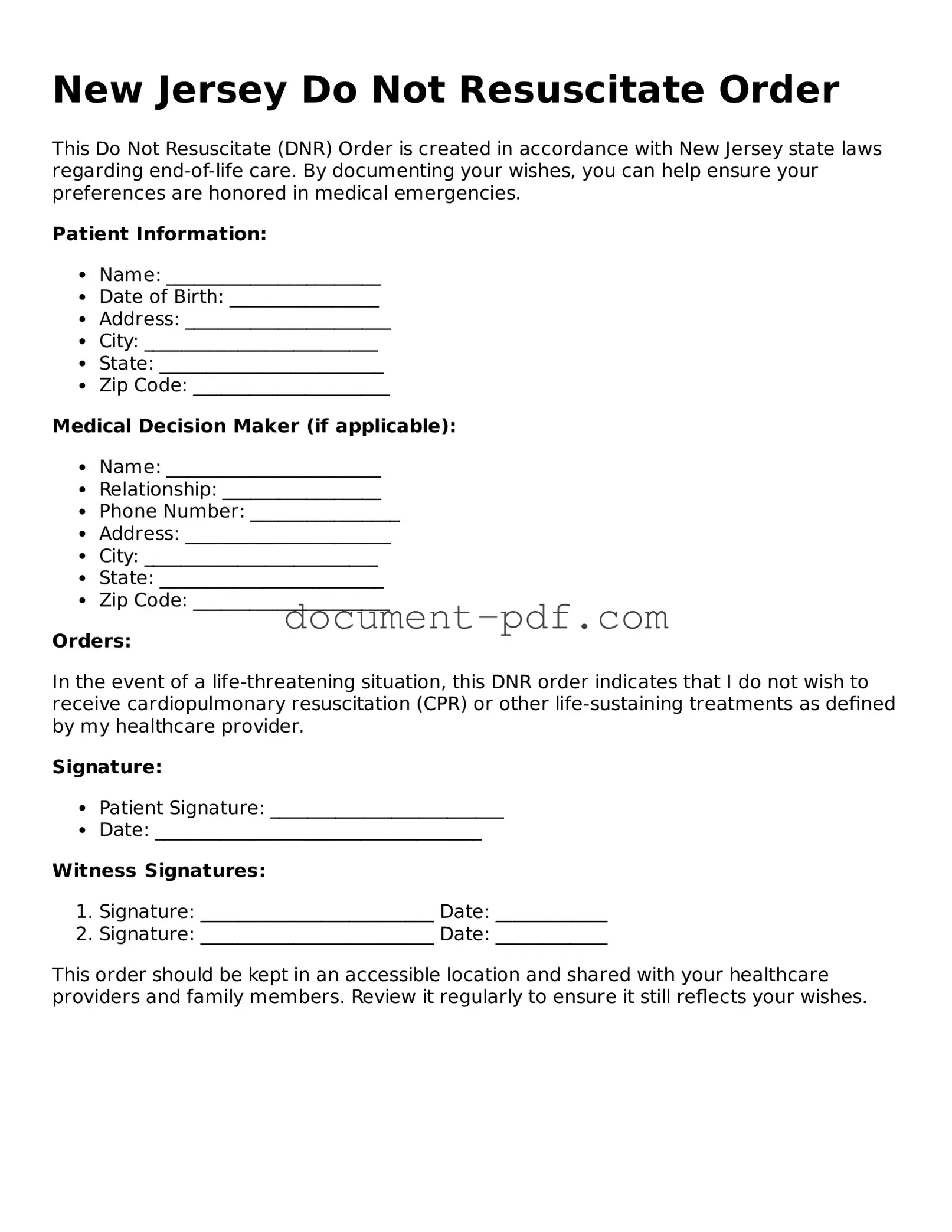The Advance Healthcare Directive is a crucial document that allows individuals to outline their medical care preferences in advance. Similar to the New Jersey Do Not Resuscitate Order, this directive enables a person to appoint a healthcare proxy and specify their wishes regarding life-sustaining treatments. Both documents aim to ensure that medical decisions reflect the individual's desires, particularly in situations where they may not be able to communicate them directly.
The Living Will is another important document that shares similarities with the Do Not Resuscitate Order. A Living Will provides guidance on a person's preferences for medical treatment in the event of a terminal illness or irreversible condition. Like the DNR, it focuses on the types of interventions a person wishes to receive or decline, ensuring that healthcare providers honor their choices during critical moments.
The Physician Orders for Life-Sustaining Treatment (POLST) form is designed for individuals with serious health conditions. It translates a patient's wishes regarding resuscitation and other life-sustaining treatments into actionable medical orders. This document is similar to the DNR in that it conveys a clear message about the individual's preferences, but it is more comprehensive, covering a wider range of medical interventions.
The Medical Power of Attorney allows individuals to designate someone to make healthcare decisions on their behalf if they become incapacitated. This document parallels the DNR in its focus on ensuring that a person's medical wishes are respected. While the DNR specifically addresses resuscitation, the Medical Power of Attorney provides a broader scope, allowing the appointed agent to make various healthcare decisions according to the individual's preferences.
The Health Care Proxy is a document that appoints someone to make medical decisions for an individual if they are unable to do so themselves. It shares similarities with the DNR by emphasizing the importance of honoring a person's wishes. While the DNR specifically pertains to resuscitation efforts, the Health Care Proxy can address a range of medical treatments, ensuring that decisions align with the individual's values and desires.
The Do Not Intubate (DNI) order is closely related to the DNR, focusing specifically on the refusal of intubation and mechanical ventilation. This document is often used in conjunction with a DNR to provide clear instructions regarding a person's wishes for respiratory support. Both documents aim to prevent unwanted medical interventions and ensure that a person's end-of-life preferences are respected.
The End-of-Life Care Plan outlines an individual's preferences for care during their final days. Similar to the DNR, this document emphasizes comfort and quality of life rather than aggressive medical interventions. It provides a comprehensive view of a person's wishes, ensuring that healthcare providers and family members understand their desires for care as they approach the end of life.
For employers seeking to streamline the process of confirming employee status, resources like the texasformsonline.com/free-texas-employment-verification-template/ can be incredibly helpful. This template simplifies the requirements for providing accurate employment verification, ensuring compliance while supporting employees in their applications for benefits.
The Comfort Care Order is a document that focuses on providing comfort and alleviating suffering rather than prolonging life through medical interventions. Like the DNR, it prioritizes the individual's comfort and dignity in the face of serious illness. Both documents aim to guide healthcare providers in delivering care that aligns with the patient's values and wishes.
The Do Not Hospitalize (DNH) order is similar to the DNR in that it expresses a person's desire to avoid certain medical interventions. Specifically, it indicates that an individual prefers to remain at home or in a preferred care setting rather than being admitted to a hospital for treatment. This document reinforces the importance of respecting an individual's choices regarding their care environment and treatment options.
Finally, the Palliative Care Plan is a comprehensive approach to managing the symptoms of serious illness. While it may not directly relate to resuscitation, it shares the same goal of enhancing quality of life. Like the DNR, the Palliative Care Plan focuses on the individual's comfort and preferences, ensuring that their needs are prioritized during their healthcare journey.

